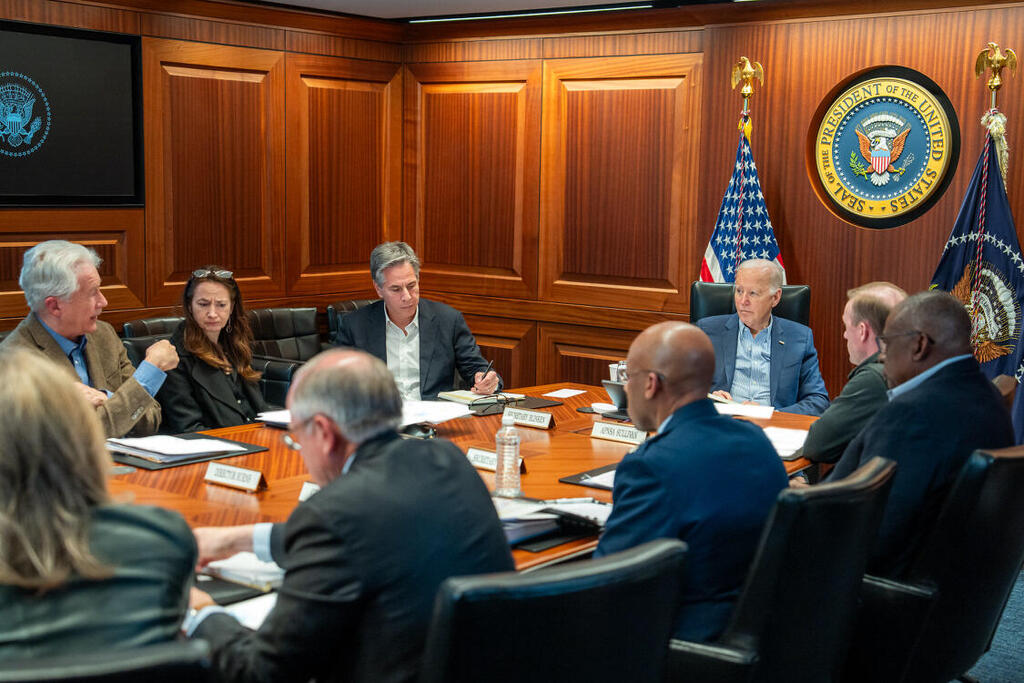As Iran launched its strike on Israel with hundreds of missiles and drones launched at its borders, U.S. President Joe Biden convened with his senior aids and members of his cabinet in the White House situation room watching as the air defenses of Israel, the U.S. and others, thwarted what could have been the beginning of an all-out regional war, according to a report in the Wall Street Journal.
Pres. Biden speaking to US air forces on their efforts against Iranian attacks
The strategic session in the White House kicked off at 17:15 Washington time, which was 15 minutes past midnight in Israel, amid uncertainty. President Biden's team, despite recent U.S. military reinforcements in the region, was unsure if Israel's air defense could counteract the incoming threats effectively. "The results of the interceptions were not clear until everything was said and done," stated a high-ranking official from the Biden administration during the ordeal.
According to the report, Tehran's direct onslaught was a realization of the most concerning predictions by U.S. intelligence. Not only did it pose a severe threat to Israel, but it also jeopardized President Biden’s efforts to avert a crisis potentially escalating into a comprehensive regional conflict in the Middle East.
The suspenseful vigil by Biden and his national security squad marked one of the crisis's peak tensions, filled with uncertainty about the intentions and capabilities of both sides during those pivotal moments. As the attack commenced, U.S. personnel in both the situation room and the Pentagon watched as three distinct assault waves launched from Iran traversed through Iraqi and Jordanian airspace toward Israel. The scale of the attack, despite prior warnings, was startling. "It was the most extreme scenario, I think, among those we anticipated," remarked a senior official, reflecting on the gravity of the situation.
As tensions continued to rise, President Biden, deeply concerned about escalating violence, took a strategic pivot toward urging restraint after the last wave of Iran’s attacks on Israel concluded without major damage. This shift came during a crucial conversation held at 9:00 PM Washington time with Israeli Prime Minister Netanyahu. During this discussion, with the war cabinet present, Biden strongly advised Netanyahu to "take the victory" and reflect carefully on Israel's next steps, a sentiment echoed by American sources.
In light of these events, U.S. officials expressed concerns about potential retaliatory acts by Iranian proxies against American forces stationed in Iraq and Syria, where around 4,500 U.S. troops and civilians are based. Speculations were also rife that Iran might target an Israeli embassy abroad in response to the assassination of Revolutionary Guards senior Hassan Mahdawi in Damascus on April 1, an attack widely attributed to Israel.
Following the Damascus incident, Iran purportedly used the Swiss embassy in Tehran to convey a threatening message to the U.S., accusing it of involvement in the attack, as reported by American sources. Despite Washington's denial of any involvement, AFP revealed just days prior to the Iranian retaliation that Switzerland had played a pivotal role in mediating communications between the nations. With the prospect of further Iranian aggressions, a senior American official disclosed to AFP that "the USA sent a series of direct messages to the Iranians through the Swiss channel" about ten days before.




